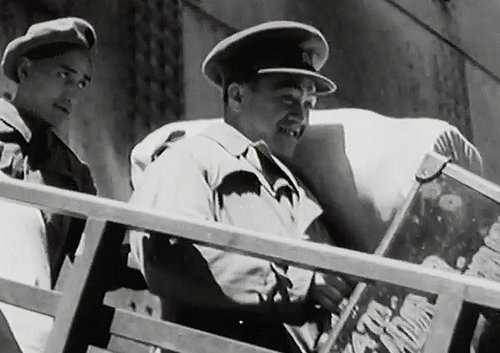
Ngā Taonga Sound & Vision has announced the launch of the second of four online exhibitions made up of material drawn from Ngā Taonga Kōrero collection – the archive of RNZ’s Māori radio programmes. The collection contains recordings made between the 1930s and the 1980s and is a unique storehouse of kōrero, spanning many iwi and dialects.
For this second exhibition of early reo Māori recordings, Te Hokinga Mai o Te Rua Tekau mā Waru, Ngā Taonga has chosen to highlight the welcome home given to members of the 28th Māori Battalion when they arrived to a civic reception at Aotea Quay, Wellington on January 23, 1946. The Mobile Recording Unit of the New Zealand Broadcasting Service captured the speeches, waiata and haka from the day.
Following the welcome home Battalion members left for their final destinations on three trains heading north to Kaikohe, east to Gisborne and Napier and west to Whanganui and New Plymouth. The Mobile Recording Unit staff flew with a portable disc recorder by special plane, so the exhibition also includes the pōwhiri at Ngāruawāhia and Kaikohe.
Ngā Taonga Pou Ārahi, Honiana Love says: “The launch date of the new exhibition, 23 January 2018, coincides with the arrival home of the Battalion 72 years ago. Te Hokinga Mai o Te Rua Tekau mā Waru will allow us to hear again the voices from what must have been an emotional day – the voices of Kīngi Tahiwi, Īhāia Puketapu, Eruera Tirikātene and many others.
The recordings of Ngā Taonga Kōrero contain many outstanding examples of oratory and Māori performing arts. Ngā Taonga is committed to sharing these taonga so that more New Zealanders can hear again the rich vocabulary captured in these recordings, and through that, appreciate and value te kounga o te reo,” says Ms Love.
RNZ Head of News, Carol Hirschfeld says: "Te reo Māori has been included in Radio New Zealand programming for more than 70 years and the current RNZ partnership with Ngā Taonga Sound & Vision allows New Zealanders to access a very rich and valuable vein of archival recordings. It’s a partnership that also reflects RNZ’s ongoing commitment to creating high-quality Māori content, supporting te reo Māori and fostering contemporary Māori journalism.”
The first exhibition, Te Pūtaketanga o Ngā Taonga Kōrero, which was launched in September 2017, highlighted the oldest recorded Māori broadcast – recordings of the opening of Tūrongo at Tūrangawaewae marae, Ngāruawāhia in March 1938. That exhibition can be found here.
Hero image: Still image from Weekly Review 232: Māori Battalion Returns